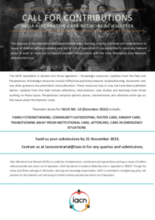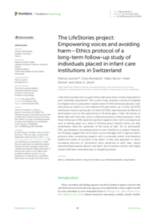Displaying 1371 - 1380 of 14555
The Institute on Statelessness and Inclusion (ISI), Child Identity Protection (CHIP) and supporting organizations convened a symposium focusing on “The Child’s Right to Identity in Emergency Settings”. The symposium delved deeper into the challenges of protecting and preserving identity rights, including nationality rights, for children on the move and children affected by armed conflict. It examined how children’s identity rights are undermined in emergency settings, the increased risk of statelessness and the need for urgent action on repatriation, reintegration and reunification of children affected by armed conflict.
Organised jointly by ENIL-ECCL and Disability Rights Defenders, this webinar on November 22, 2022, featured speakers from Sweden, Slovenia and Scotland on the UN Guidelines on Deinstitutionalisation, including in Emergencies.
India Alternative Care Network (IACN) is calling for contributions to the tenth edition of its newsletter, IACN Quarterly .
This is the story of three people deeply touched by American safe haven laws.
Twenty-five years ago, President Bill Clinton signed the Adoption and Safe Families Act. Passed in 1997, with broad bipartisan support, ASFA reflected a genuine commitment to the well-being of children and concern over them spending long months and even years in different foster care homes. Adoption was positioned as a positive and permanent solution for children in temporary care placements. Today, adoption is in the news again, especially with the Supreme Court’s Dobbs decision, which ended the legal right to an abortion.
The current study assesses a protocol designed to mitigate risks in a population-based cohort of 246 individuals placed in care institutions as infants in a non-selective 60-year follow-up. In total, 116 (47%) individuals chose to participate, of whom 53 (55%) reported positive effects of participation such as the opportunity to fill some gaps in their life stories, to better deal with their past, and to understand previous family dynamics.
This Human Rights Watch report examines removals of children and termination of parental rights by state child welfare systems in the U.S., focusing primarily on four states: California, New York, Oklahoma, and West Virginia.
The US child welfare system punishes people for living in poverty and disproportionately impacts Black and Indigenous families, according to a new report produced by Human Rights Watch and the American Civil Liberties Union. The failures of the system can haunt families for decades by limiting their employment opportunities and exacerbating a cycle of poverty that can trap successive generations in the child welfare net.
Native Americans are speaking out decades later about the abuses and indignities they endured at a school designed to “kill the Indian” in them.



